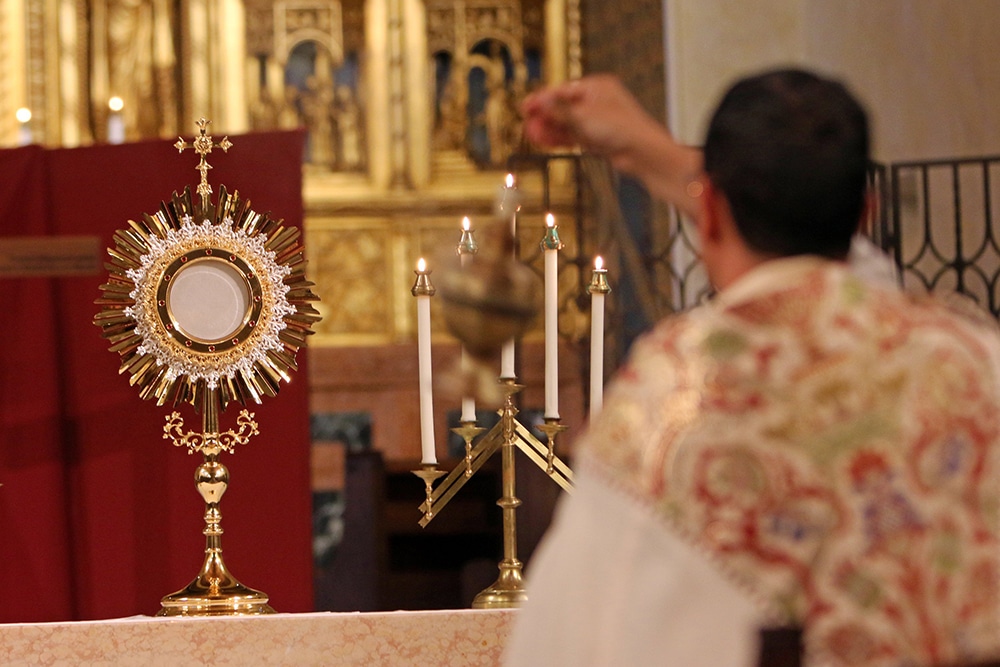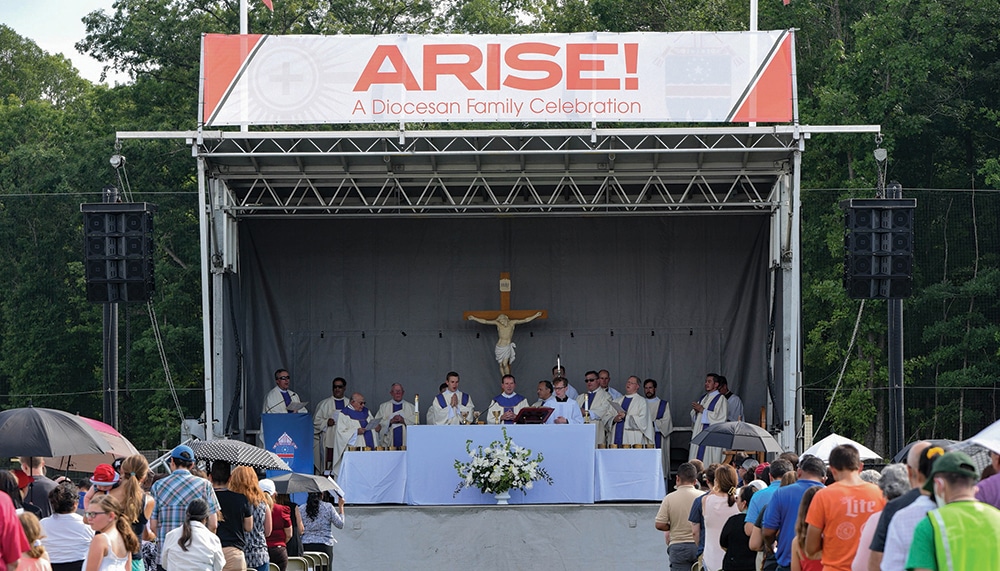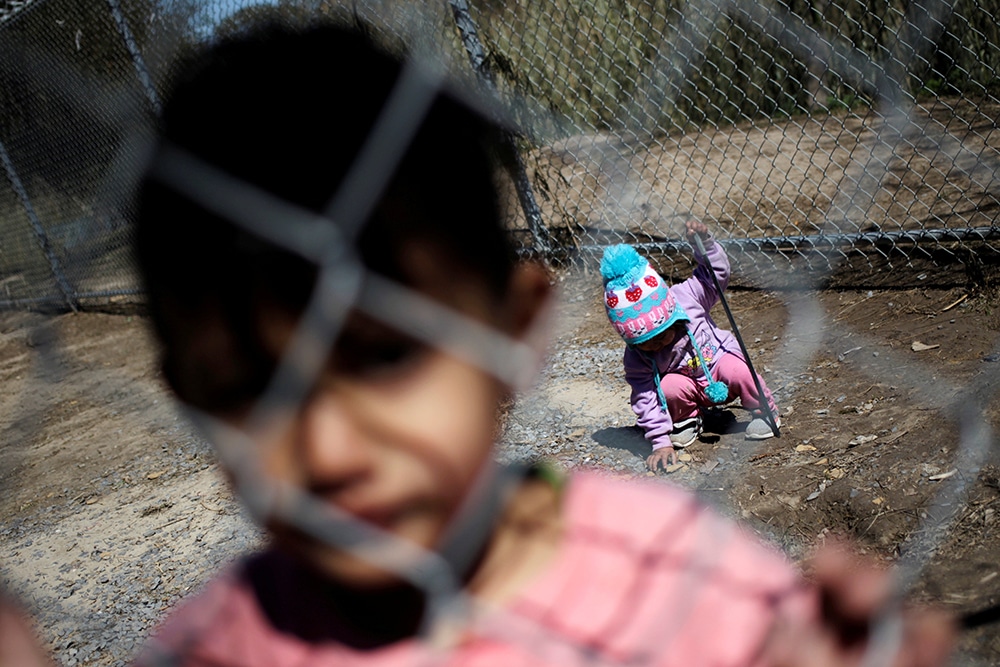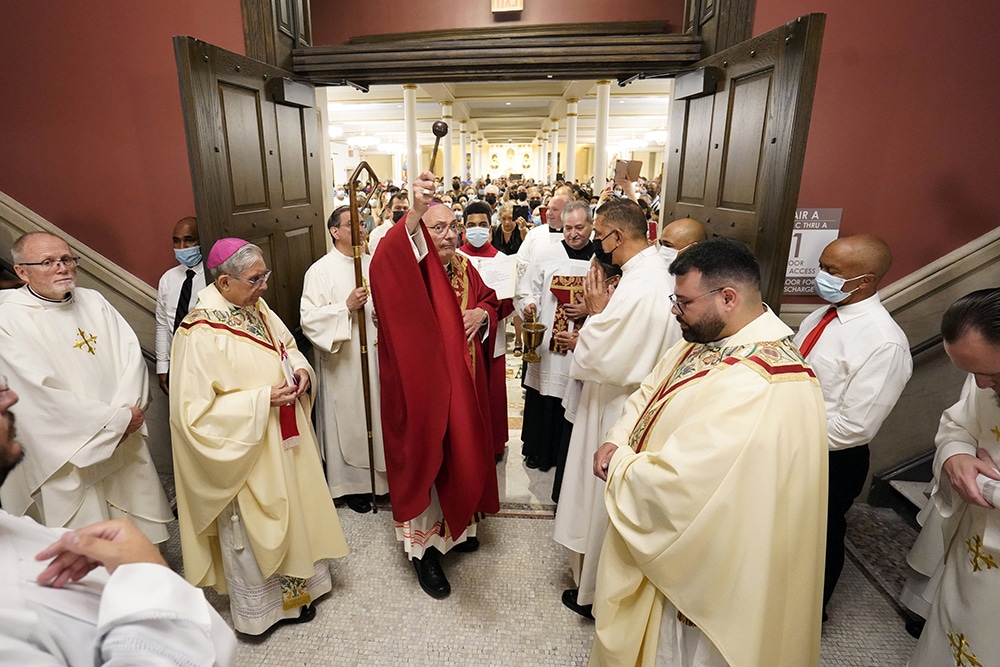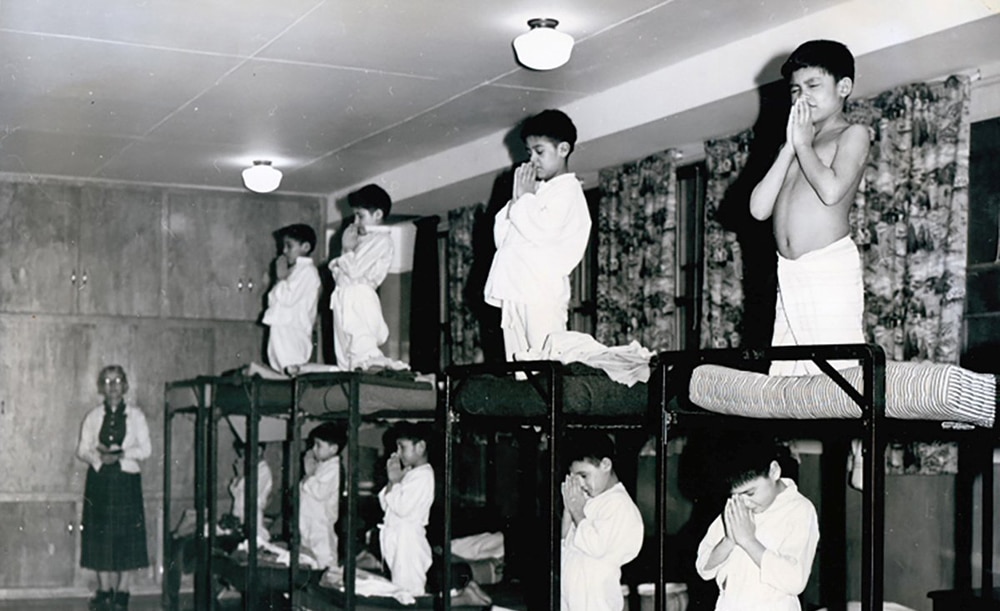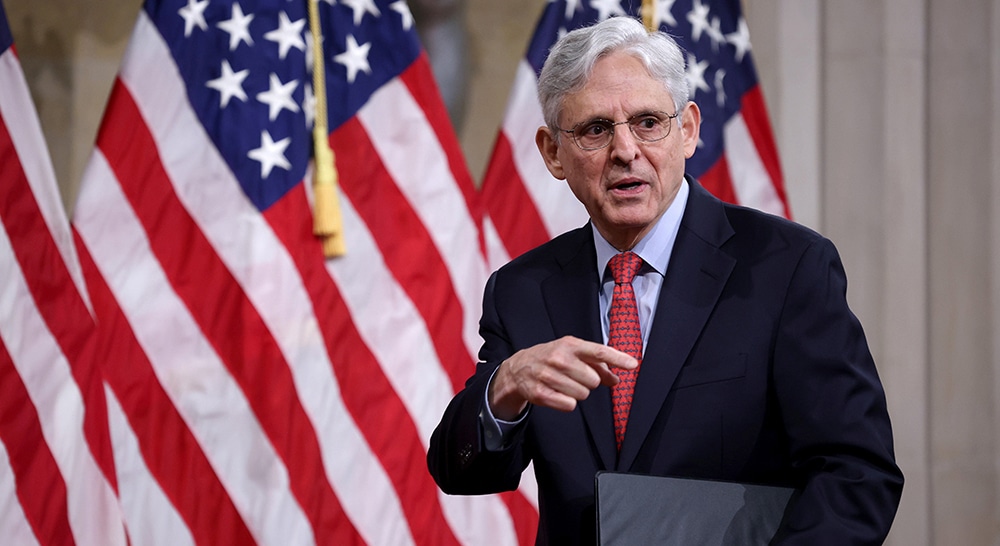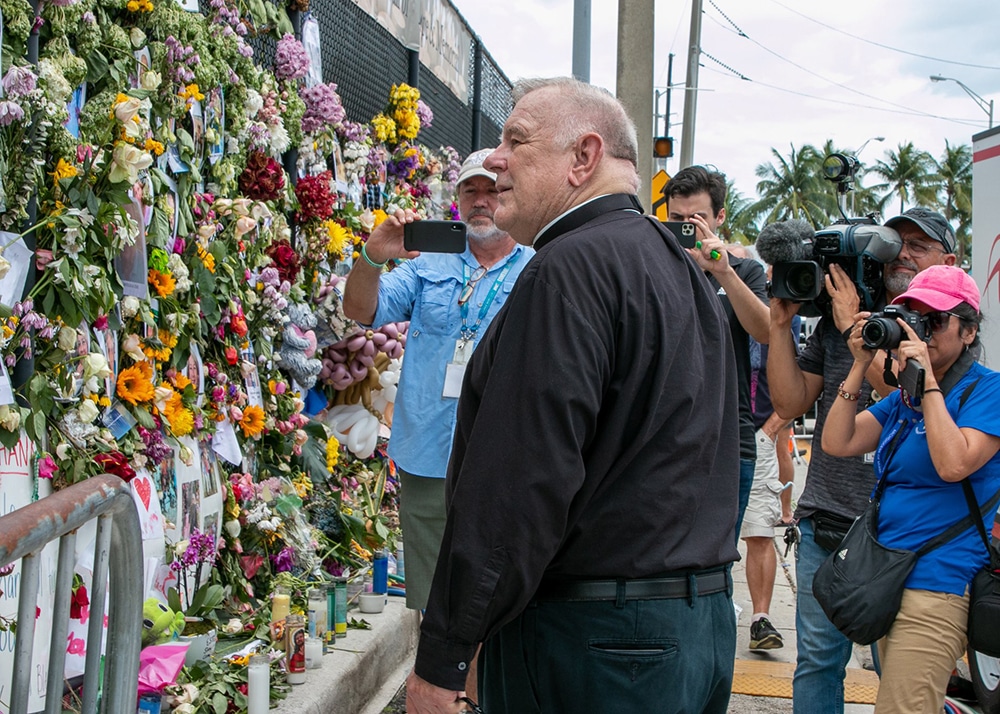Commissioning “Eucharistic missionaries” is an idea that has “captured the imagination” of people involved in the planning for the U.S. Conference of Catholic Bishops’ three-year initiative to rekindle devotion to the Eucharist.
“We’re really looking at the revival as an opportunity to form and send Eucharistic missionaries out to share the Good News, to serve those who are most in need and those who are on the margins,” said David Spesia, executive director of the bishops conference’s Secretariat of Evangelization and Catechesis.
In an interview with Our Sunday Visitor, Spesia discussed the planning and vision for the National Eucharistic Revival, which aims to renew the Church at the parish, diocesan and national levels by enkindling a living relationship with Christ in the Eucharist.
Our Sunday Visitor is one of the organizations collaborating with the U.S. Conference of Catholic Bishops for the initiative, which is set to run from July 2022 through December 2024 and could include a National Eucharistic Congress in 2024.
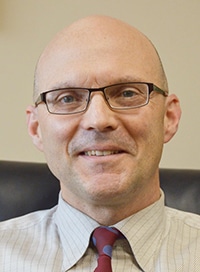
Spesia said the planning for the Eucharistic initiative began soon after the Pew Research Center in August 2019 released a survey that indicated only one-third of Catholics believe in the Real Presence. He said the Eucharistic Revival has been in the works for well over a year, long before the controversy over the bishops conference’s decision to draft a teaching document on Eucharistic consistency in light of Joseph Biden, a Catholic who supports keeping abortion legal, becoming president of the United States.
Our Sunday Visitor: What role exactly did the 2019 Pew survey play in the genesis of this initiative?
David Spesia: Bishop Barron was chairman of the committee on evangelization and catechesis at the time it came out. He brought it up at one of the USCCB’s administrative meetings. A number of other bishop-chairmen approached him and expressed interest in working together and thinking about how we could move forward in some new ways. They actually had a couple of meetings prior to COVID-19. Then of course with the pandemic, there were concerns on many levels that exacerbated a sense of the importance and the need to do something. It also shifted the conversation a little bit, too, to make this a little bit more of a broad approach that would address the teaching as well as the worship and devotions as well as the missionary outreach.
Our Sunday Visitor: Almost two years since that survey, which some have faulted as misleading, do you have a better sense of where Catholics are regarding belief in the Real Presence?
Spesia: A number of people have raised concerns about the Pew study and the wording of it. It’s possible some people may have read the question differently and that’s why they answered the way they did. It’s not necessarily a definitive benchmark, but we are working with some of our collaborators and partners to look at some of the other research that has been done to help us get a better sense of the belief and practice around (the Eucharist).
We certainly know the Mass attendance numbers for the last number of years have been in a steady state of decline. In my mind, that points to people not having a deep-rooted connection to Christ coming to us in the Eucharist. If I really believe that Christ is present, then I’d be at Mass every Sunday. I would maybe try to get to daily Mass whenever I could. That, I think, is one indicator, but we are also looking at the other research that’s been done to get a better sense of the problem.
Our Sunday Visitor: How do you think the pandemic impacted Catholics’ sense or hunger for the Real Presence?
Spesia: I tend to be a little hopeful about things until absolutely proven otherwise. I think a hopeful perspective would be that a lot of people did have some kind of renewed experience of the Mass through the virtual and live-streaming experience in the intimacy of their own homes. I know there are concerns that maybe people got too comfortable with a cup of coffee in their (pajamas). But I do think there are some insights that people may have come to that we’re going to be able to build upon. I think also finding the right way to invite people by telling them the livestreamed Mass experience might have been really powerful for you, but it’s like seeing family members on Zoom. It’s good, it’s better than not talking or not seeing them. But being with them in person is really what you want to do. You want to be able to hug them. You want to be able to give them a kiss. And when we’re at Mass together as a community, that’s what we’re able to do in person with the Lord and with each other.
Our Sunday Visitor: A lot of the discussion and planning for this Eucharistic Revival has been done at the USCCB level. Is there a demand or desire for this at the local level of the Church?
Spesia: In the various brainstorming sessions we’ve been doing and talking with potential partners and collaborators, and there’s definitely a grassroots interest in assisting and helping with this. In terms of a demand, I guess there is kind of a question; For people who aren’t aware of the centrality of the Eucharist and the celebration of the liturgy in the life of the Church, are they aware of a need for more of a connection? I think deep down, yes they are. Deep down there is a grassroots need. Absent a relationship with Christ, I think what we’re left with is what we’re seeing on so many levels, which is division, disunity, lack of peace, this sense of ‘I’m stuck where I am and I don’t see any path forward.’ I do think there is a deep down hunger for an experience that changes my life, that moves me forward closer to the Lord and that changes all my relationships.
Our Sunday Visitor: What will the national event or potential Eucharistic Congress entail?
Spesia: The national event still needs to be finalized by the bishops. They’ll be voting on it in November. The idea would be something more like World Youth Day than a leadership convocation. Like a World Youth Day, there will be a sending of all those participants back to their parishes and dioceses. It will very much have a missionary mindset to it. We want Eucharistic missionaries who will have had an encounter that’s been transformative, that they’ll be able to go back to their parishes and dioceses and share.
Our Sunday Visitor: How is the planning for that national event coming along?
Spesia: Behind the scenes we’re exploring possible locations and potential funding partners and collaborators. There is some work going on behind the scenes to try and make sure that this is viable and that it’s going to be something that is very much doable for the Church as a whole. I think there is also some interest in looking at possible regional locations that would either lead into the national event or provide other options for people to participate in this as a movement. We’re looking at the Eucharistic Revival as a movement that is going to move forward on multiple fronts.
Our Sunday Visitor: Are you concerned that the politically-charged debate surrounding the proposed document on Eucharistic consistency will impact how Catholics and others view the Eucharistic Revival?
Spesia: In the secular press, the potential political dimension of that document has definitely been raised. That is a concern. But my sense is that it’s actually going to be a teaching document that will help support renewal on broad levels, not a political statement. My impression of the recent bishops’ meeting in June is that the bishops want Eucharistic revival. They want a deeper commitment and understanding of the gift, and that renewal is really where the focus is going to be.
Brian Fraga is a contributing editor for Our Sunday Visitor.

